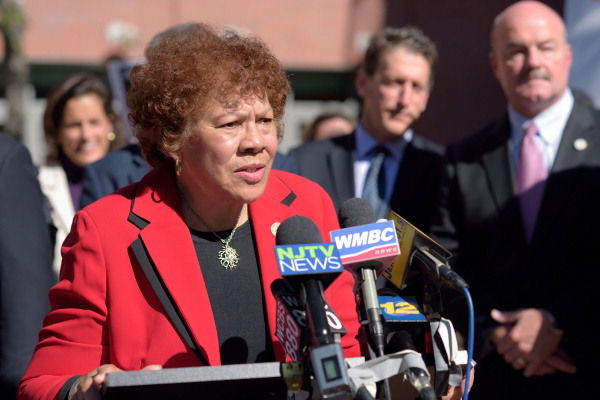By Lea Kahn, Staff Writer
Filling up the gas tank of a Ford Escort costs the same amount of money, regardless of whether the driver is a man or a woman., So, why shouldn’t a woman be paid the same amount of money as a man for performing the same job in the same office or store?, There is no reason, and that’s why New Jersey lawmakers – including state Sen. Shirley Turner (D-15th Legislative District) – have pushed to pass legislation that mandates equal pay for equal work., “Women have to pay the same amount to buy gasoline or food as men. We don’t get a discount because we are not being paid the same salaries as men,” Turner said., The state senator spoke to about 50 women and a handful of men in the second of a series of talks, sponsored by the United State of Women, Mercer County Chapter, to discuss current issues. She made her remarks Sunday night at the West Windsor Arts Center on Alexander Road., Turner is a co-sponsor of legislation that would amend the state Law Against Discrimination. It would require employers to stop offering women different pay rates and benefits packages for doing substantially the same work as men. An employer who violates the law would have to pay damages and make up the back pay to the date that the discrimination began., The bill was conditionally vetoed by Gov. Chris Christie last year because it would not be business-friendly. The governor objected to the provision of unlimited back pay, as compared to the federal Lilly Ledbetter Fair Pay Act of 2009. Federal law limits back pay to two years’ worth., An effort in the state Senate to override Gov. Christie’s veto failed in January. Only 23 of 40 state senators voted to override it, when 27 votes are required. Turner was one of the 23 who voted to override the veto., State Sen. Loretta Weinberg (D-37th Legislative District), who sponsored the bill, is trying to work out a compromise., Meanwhile, Turner said unequal pay for equal work also hurts women because they live longer than men after retirement. Pensions and Social Security payments are based on the last few years of an employee’s salary. If a woman is paid less, then she will receive less., “You are not going to be able to retire and pay for yourself,” Turner said., The state senator said New Jersey does not have economic justice if women are being paid less than men for performing the same job. She recalled that when she applied for a job, she was told that she could be paid less because she was married., “That, of course, is ridiculous. It is not economic justice when you are not being paid fairly. You can’t have social justice if you do not have economic justice. That’s what it is all about,” Turner said., Turner suggested that it might be different if there were more women in the State Legislature. Of 40 state Senators, 11 are women. In the state Assembly, 25 of the 80 Assembly members are women., Turner said she became involved in politics when she was asked to run for the Mercer County Board of Chosen Freeholders. She was elected to the Freeholder board and served from 1983-1986., Turner was asked to run for a seat in the Assembly, and served from 1994 to 1998. She was elected to the state Senate in 1998., “People said I would lose in the state Senate race. I had a tough Republican opponent, and I had to decide whether to stay in the Assembly or challenge him. I rolled the dice and I won,” she said., Turner offered some advice to prospective politicians in the audience. First, be aware of the issues. Become pro-active, begin to network and help to get other candidates elected., “You have to get involved. You have to step up. Don’t wait to be asked to run,” she told the women in the audience., Becoming a candidate for elective office requires commitment. It’s a long campaign, and “you have to be ready to wear out your shoes” by going door to door to talk to voters, she said. Fundraising also is important., “We need more women in power,” Turner said.

